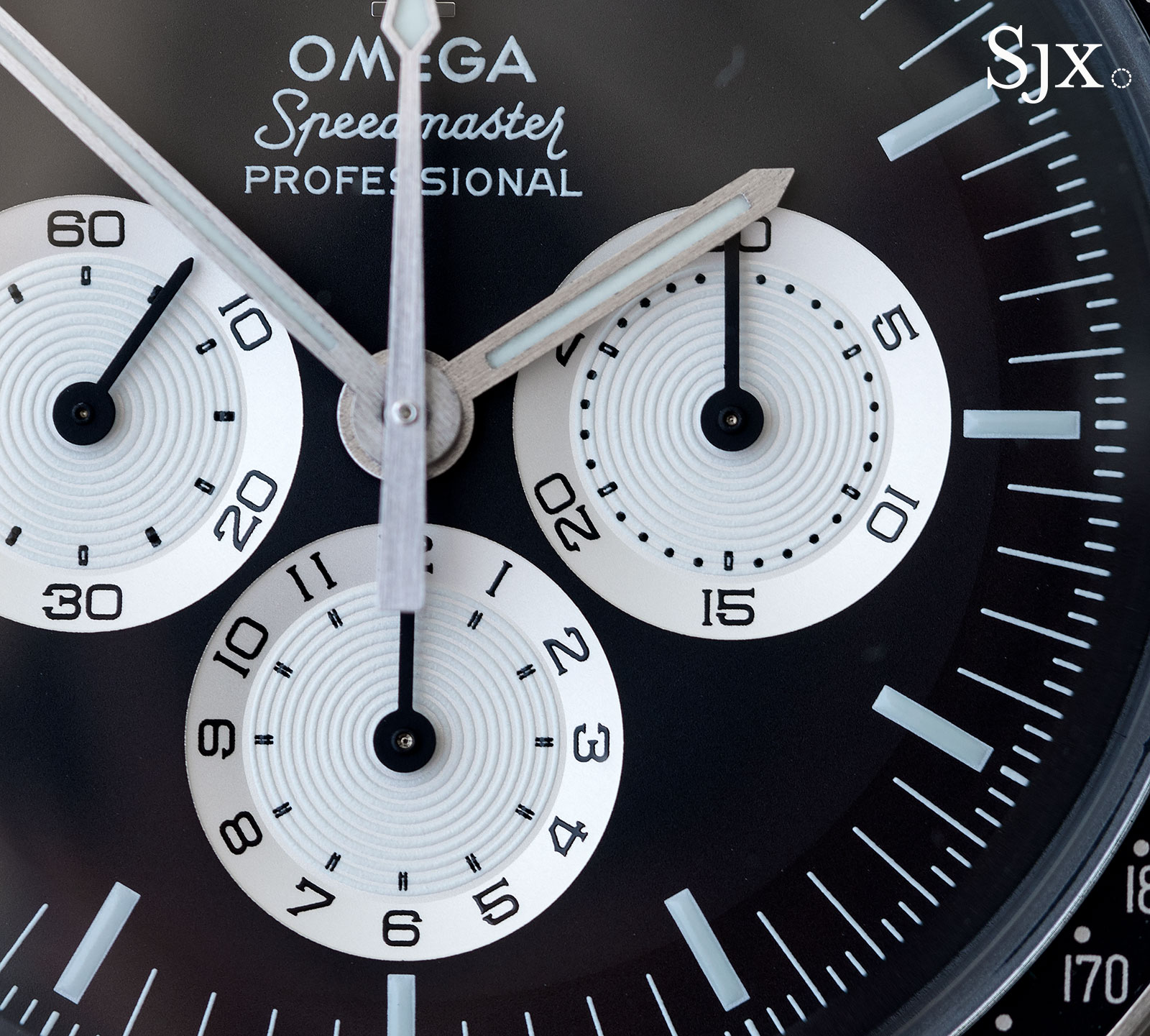Living With the Omega Speedmaster “Speedy Tuesday”
Does the online-exclusive limited edition live up to expectations?
A surprise that Omega sprung on the world in early January, the Speedmaster “Speedy Tuesday” was offered only online, instantly becoming a hit that sold out in four hours and even meriting a mention in the Swatch Group annual report. They have just started to reach boutiques, and I received one recently.
The Speedy Tuesday is a handsome watch on the wrist, and like the standard Speedmaster, easy to wear. It’s not too big and not too small, neither too heavy nor too light. But the Speedy Tuesday is sold only with either a leather strap or a striped, prison garb-like NATO strap, which is a shame as it will look good on a steel bracelet since the silver sub-dials would complement the colour. (Some participants on Omega Forums have already gone the bracelet route.)
The straps are of good quality, but feel a bit too fashion-forward. Both are styled to suit current tastes, though neither really suits the “Moon” factor in the Moonwatch. The packaging is conveniently compact, but like the straps it feels overly curated: a brown leather roll with pouches for the spare strap, microfibre cloth and NATO.
Up close the Speedy Tuesday has a couple of things going for it, all of which blend well together to make it a strong proposition on the wrist. While the Speedy Tuesday retains all the key characteristics of the modern Moonwatch, minor tweaks and tucks make it distinct. In fact, the Speedy Tuesdays is easily distinguished from other Moonwatch editions, even from a distance. That’s a good thing since there are so many of them, with Omega having produced more Moonwatch limited editions than NASA sent missions to the Moon.
Few Speedmaster Moonwatch variants have a “Panda”, or in this case a “Reverse Panda”, colour scheme. The silver-on-black dial is striking and enhanced by a handful of well chosen details. One is the applied vintage-style Omega logo that gives the dial depth while evoking pleasant nostalgia.
Another is the linear brushed finish on the hands that gives the dial a clean, functional appearance. Although it should be pointed out that the brushed finish traps dust and oil, which appears to be the case on this particular watch that is fresh off the production line.
But the highlight is the sub-dials that take inspiration from the experimental Alaska Project III Speedmaster of 1978. This means they have radially position numerals in an unusual serif font, along with a misaligned “20” on the minute register at three o’clock that was also on the original prototype. But like the hands the chronograph registers reveal imperfections up close, with fuzzy printing and uneven finishing on the edges where the black dial meets the recessed silver sub-dial.
Usually, the raised concentric rings on the sub-dials are not stamped guilloche, but Super-Luminova. All three chronograph registers glow in the dark, though at one notch below the brightness of the hands and hour markers.
The Super-Luminova is actually one of the best bits of the watch, not for what it is, but what it is not. The lume is a fresh bluish white, just as it should be on a new watch. This is not a pretend-vintage watch with faux vintage lume, a trap that other watches often find themselves in with today’s fashions (even extremely well executed watches like the Tudor Pelagos LHD).
The case is another point of distinction. While the case form is bog standard Speedmaster with its characteristic lyre lugs, the finish is entirely brushed. Modelled on a similar finish for the Alaska Project II prototype, the matte finish is extremely atypical for a commercially available Speedmaster, but it is an attractive one that is both discreet and no-nonsense.
In addition, the case finish feels slightly neater and sharper than that on an ordinary Moonwatch (which has an alternating polished and brushed finish), though that might just be a psychological misperception.
To match the retro Omega logo on the dial, the crown has a similar logo cast in relief. Unlike the case, however, the crown has a sandblasted finish. The difference isn’t apparent on the wrist, though evident when the watch is viewed in profile.
Everything on the front of the watch is helpfully summarised on the back. The “radial” sub-dials are noted, radially on the edge of course, along with the Alaska Project references.
Underneath the back is the cal. 861, which is the hand-wound Lemania 1873. It’s nothing to shout about but still a solid, reliable movement that’s been used in the Speedmaster since 1968. Being a mid-tier movement it has a cam-operated chronograph mechanism, but is still more than adequate for a watch in this price segment.
The Speedy Tuesday does live up to expectations. It is a well executed watch on many levels – design, concept and feel – while being relatively reasonably priced.
While the relatively small number produced (the run was 2012 watches compared to say, 7007 for the latest James Bond watch) means that not everyone who wants one will get one, it’ll help keep the watch uncommon.
That being said, odds are this is one cow Omega (and its sister companies in the Swatch Group) will continue to milk, given how well the Speedy Tuesday sold. It won’t be exactly the same but it will be similar, with a high chance of being another online-only offering. So anyone disappointed this time can just wait for the next one to come around.
Price and availability
While the Speedy Tuesday is already sold out, Omega says boutiques do have waiting lists in case any orders are cancelled. The Speedy Tuesday (ref. 311.32.42.30.01.001) is priced at US$6500, €5300 or S$8400.
Addition July 23, 2017: Strap and packaging included in story.
Back to top.